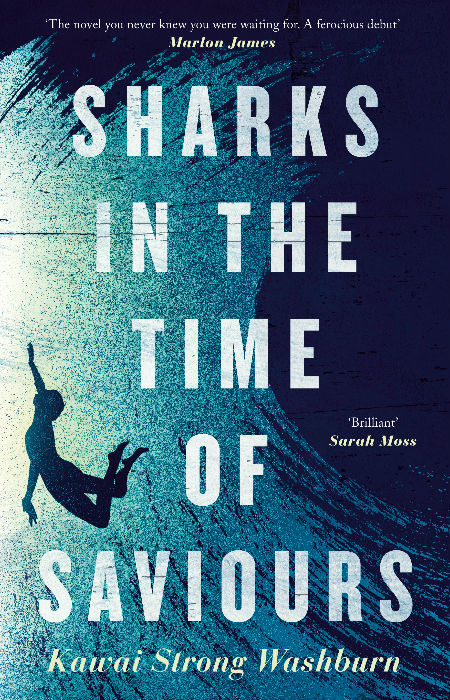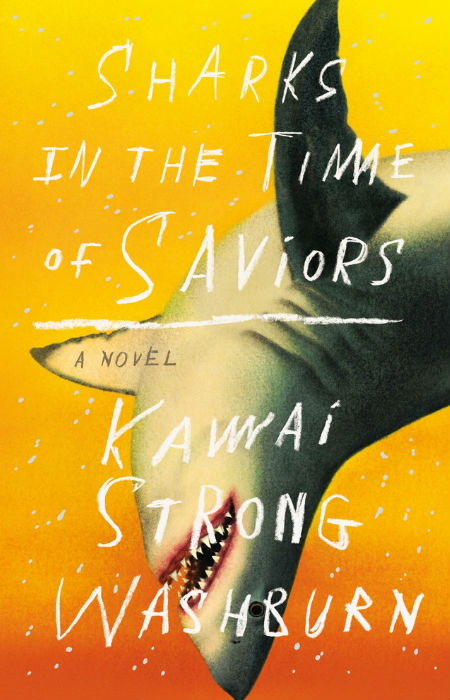
There are novels that quite happily skim the surface of the deep well of emotions that make up most people and then there are novels like Sharks in the Time of Saviours, the immersively impressive debut novel from Kawai Strong Washburn, which dive in, hard, deep and long, unafraid it seems to explore the furthest reaches of our humanity.
The brilliance of this achingly beautiful piece of work is that for all the gorgeousness of its prose, its sharp observance of the rise and many falls of being alive and its honest exploration of the way expectations and reality rather cruelly never quite seem to meet, is that it is inherently an emotionally accessible piece of writing.
That’s because the author never once loses sight of the inherent humanity of the characters in a story that is as groundedly real as it gets.
These are people who want to reach, or try to reach for the moon, and fail, not because they don’t have dreams, hopes or ambitions, or the will to make them flesh, but because life gets in the way and there is no way around, over or under it, and they are forced, as so many of us are, to make the best of where we remain or eventually land.
As dreams go, the Flores have some big ones.
The middle child of the family, Nainoa, is saved from drowning in 1995 off the waters of Kailua-Kona, Hawai’i by a shiver of sharks, and thereafter is believed to be gifted to do great things, a young man in touch with the natural world around him to such an accent that he is able to heal people simply by imagining how they should be, not how sickness or injury have rendered them.
“On Christmas I call again to talk. It’s gotten harder with my family now. Each of us with our own language of death and grieving and no avenue for translation. There’s this weird thing where I don’t get to talk to Dad as much as I used to—whenever I call, Mom has some reason he can’t come to the phone. It’s weird, okay? Our phone calls turn into a board game where no one knows the way to win but everyone knows the way to lose …” (P. 236)
It’s a gloriously uplifting idea, the sense that one life could have so much potential meaning and purpose, and Nainoa’s mother, Malia, who retains an abiding belief in the presence and power of the ancient Hawaiian gods, clings to it with ferocity in a life blighted by economic privation and the failure of fertile dreams to grow anything in the way of a burgeoning life.
The problem is that Noa, as he’s called by his family, comes to believe he is special too, a self-belief that eventually eats him alive when it doesn’t manifest as he or anyone else expects, pushing him away from his parents, and older brother Dean and younger sister Kaui who love him but also resent him for the way he consumes the attention of Malia and father Augie.
It is this intersection of the happily possible and the soberingly actual that informs so much of this richly-written novel which understands in ways too numerous to mention, how we are often caught between what we imagine could or can be and the the harsh realities of a world that cares little for the very best possible way of things.
Told in chapters where each character’s unique perspective is highlighted, Sharks in the Time of Saviours brings home just how this schism between hope and reality can render a family into a mute, shadowy sliver of its former self.
Certainly when Noa is saved, and the family is, as ever, close to economic ruin, there is a sense that they can make it, that there is a way forward which embodies all the good things that Augie and Malia want, not just for themselves but for their three children, each of them rich with potential.

Noa is, of course, a healer, and goes onto a career, at least at first, of bringing back from the physical brink as an ambulance officer.
It seems a natural fit but it is one borne of the heavy weight of lifelong expectation and while he might wish to be someone else, and finds someone special who believes he is wonderful with or without his supposed gifting, he can never quite extricate himself from the ideas of what he is and could be wrapped tightly around to an almost suffocating degree many years earlier.
Similarly though expressed in wholly different ways, Dean and Kaui, both of whom flee Hawai’i for the mainland and the haoles (non-Hawaiians who inhabit it), find themselves reaching for extravagant futures that don’t quite work out as planned.
The beauty of Sharks in the Time of Saviours is that it is grippingly, often confrontingly real but that it is never without hope, some form of restitution or restoration, even if that is a million miles away from what was hoped for or envisaged.
Using language that is superlatively transcendent and yet emotionally grounded at the same time, a delicate balance not every talented writer effects, Washburn takes us into the heart of belief, hope, family, loss and gains, tentative connection and wounded estrangement in a story that is never less than immensely captivating and wholly affecting.
“Mom nods. ‘It’s always like that.’
‘What do you mean?’ I ask.
“Whenever I’ve made a choice in my life, a real choice …’
She leans back from my head. Touches my shoulder for just a second. ‘I can always feel the change, after I choose. The better versions of myself, moving just out of reach.'” (P. 348)
If you have truly been paying attention to life, you will appreciate how each of the lives portrayed in Sharks in the Time of Saviours mirror your own, maybe not exactly but sufficiently that will you be able to identify with much of what these characters experience.
There is a great deal that might be alien to you too but that is no less enriching.
Drawing from a childhood spent on the Hāmākua coast of the Big Island of Hawai’i, Washburn takes us into a world of dispossession, of people who are effectively strangers in their own ancestral lands and who long to reconnect with their ancestors beliefs even as they recognise there is a pressing need in the modern day to put food on the table and realise dreams from intangible wanna-bes to bricks-and-mortar, heartfelt reality.
The Flores are trapped in many ways, trapped between the could-be and the is but they are also, though they may not often see or feel it, inexplicably bound to each other and while they don’t find their way back to each other quite as they expect or want, there is a compelling sense that all of them feel that home is Hawai’i and the company of each other.
It is this evocative sense of time and place and familial belonging that anchors Sharks in the Time of Saviours, a lusciously-expressed, richly-told story of people pincered between hope and despair, the stars and the muddy ground who find their place in life is wholly different from anything they expected but which, flaws and gritty schisms and all, might actually be a place they can live in after all.
